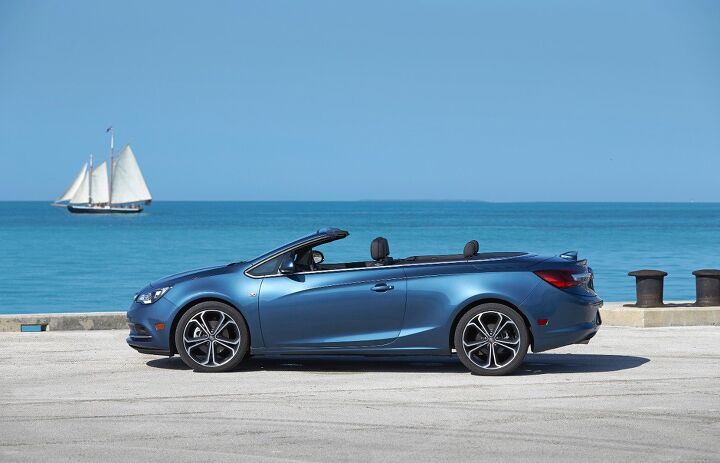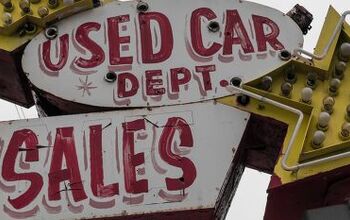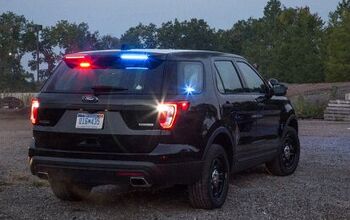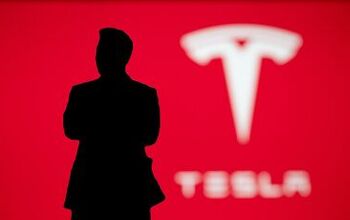A Buick Is in Danger

The Buick Cascada, known to Europeans as the Opel Cascada, appeared on North American shores for the 2016 model year, offering buyers (and renters) a pleasant, four-seat replacement for the discontinued Chrysler 200 drop-top.
Now wholly owned by France’s PSA Group, not General Motors, Opel plans to ditch the model once 2019 is up, meaning America stands to lose its last non-sports car convertible. It would also knock the Buick brand down to five models.
Opel announced Tuesday it would stop building the Cascada, introduced in Europe for 2014, after 2019. The Polish-built convertible and two other small cars “will not be replaced after the end of their life cycles,” the company said.
That seems to kibosh the idea that Opel could continue funnelling Cascadas to Buick, even after dropping the model from its own lineup. The newly Frenchified brand plans to go deeper into crossovers and electrification while dropping slower-selling cars, a strategy that seems to be a template followed by every automaker under the sun.
A Buick spokesman contacted by Motor Authority said the brand has nothing to announce about the model’s American future, but did mention that the Cascada remains an important part of the Buick family. The model draws a higher percentage of new customers to the Buick brand than any other model, the spokesman claimed. Still, the model doesn’t bring in a huge volume of buyers.
By far the slowest selling model in Buick’s lineup, Cascada volume fell 25 percent over the first nine months of 2018. A niche car, the Cascada amounted to 2.2 percent of Buick’s 2018 sales, and that’s after rounding up. The first three quarters of 2017 shows a Cascada take rate of 2.8 percent.
While the model was seldom talked about (it offered a single powertrain consisting of a turbocharged 1.6-liter four-cylinder making 200 hp and 207 lb-ft, or 221 lb-ft in overboost mode), it did provide the Buick brand with a point of interest. Something GM’s other divisions — and indeed, those of other Detroit Three automakers — couldn’t claim. Should the model disappear, the brand becomes less interesting than it already is.
[Image: General Motors]

More by Steph Willems
Latest Car Reviews
Read moreLatest Product Reviews
Read moreRecent Comments
- Billyboy The Big Three, or what used to be the Big Three, have been building sedans in the FWD unibody mold since the 80’s to compete with the Japanese - and failing. The Taurus was the only decent attempt, and even that fizzled out after a few years. Back to GM, There’s no reason to choose a Malibu over a Camry or Accord for normal buyers. The story was the same when it was the Citation, Celebrity, Lumina, and Impala, as it was the same with Ford and Chrysler. GM knows this, as does Ford, and doesn’t care - and rightfully so. Better to cede this time-worn commodity segment to others and focus to where the market has shifted.
- CanadaCraig You are not wrong. Or a dummy for that matter. I also think it's foolish of GM to kill off the Malibu. That said... I think there needs to be full-sized plain jane sedans for sale. And there are none. And haven't been for a long time. A basic BIG car. With room for six. Bench seat and all. Nothing fancy. And a low price to go along with it. I would buy one.
- OCcarguy Back in the 1980s the Mitsubishi Cordia was one of my favorite cars. I would love to see them make cars we could get excited about again.
- Chris I dislike SUVs. I think they are clunky looking and not much in the handling department. I'll take an Audi A4 or BMw three series or even a VW Jetta over any SUV. It I need more interior room for a shot time, I'll rent something bigger.
- Amwhalbi I have a sedan and an SUV, and for pure driving and riding enjoyment, I'll pick my sedan every time. But yes, SUV's are generally more practical for all around usage, particularly if you have only one vehicle. So I think the perfect answer is the sedan hatchback (a la the last Buick Regal) which can still yield the drive and ride or a sedan, yet provide a greater modicum of practical, accessible cargo capacity. Most of the sedans made could (with minor styling changes) easily become 4 door hatchbacks. Oh, yeah, I forgot - Americans don't like hatchbacks, even if they do in Europe...



































Comments
Join the conversation
A hodgepodge of old Astra bits with old Insignia/Regal style rear lights. The car the new Saab 9-3 cabrio could've been (and rumour has it that it started off as, before GM got rid of Saab) PSA Peugeot-Citroen are looking to axe all GM platform models and replace the profitable ones with home-grown platformed models. They're also axing the Viva (aka Spark) and Adam small cars, the former likely to be replaced with something on the same line as the 108/C1/Toyota Aygo. As someone who saw Chrysler Europe get snapped up, badge engineered then wound down, it is scarily like history repeating. At least it worked out well for Peugeot, the Horizon (of which the Plymouth / Dodge Omni were similar in the same way as European and US Ford Escorts were vaguely similar...) replacement Arizona became the 309 and gave Peugeot a foothold in the compact family hatchback market, where they are popular to this day - stopping the numbering increment with the last few generations of 308. Keep an eye on the Regal, US and Australia sales aren't living up to expectations (thanks to crossovers and the Kia Stinger...), PSA would be happy enough to either axe the GM platformed Insignia or replace it with a 508-based model.
it's a really nice car.......but that is the stupidest name ever put on an american car.